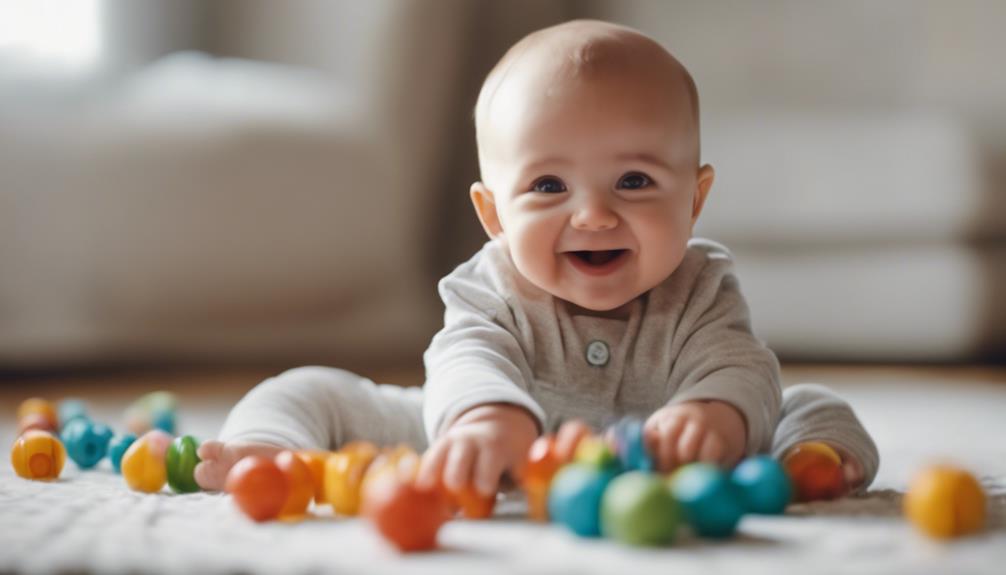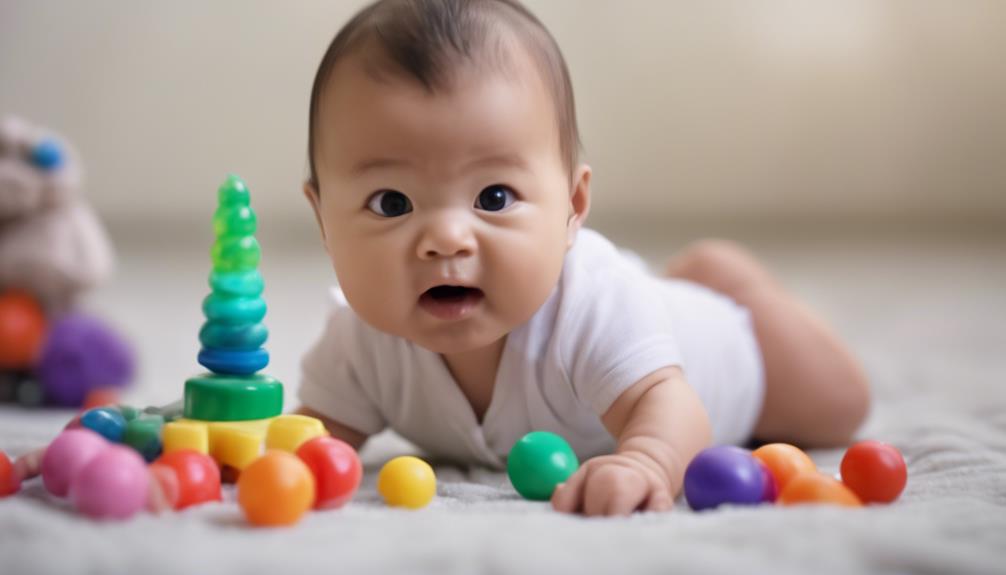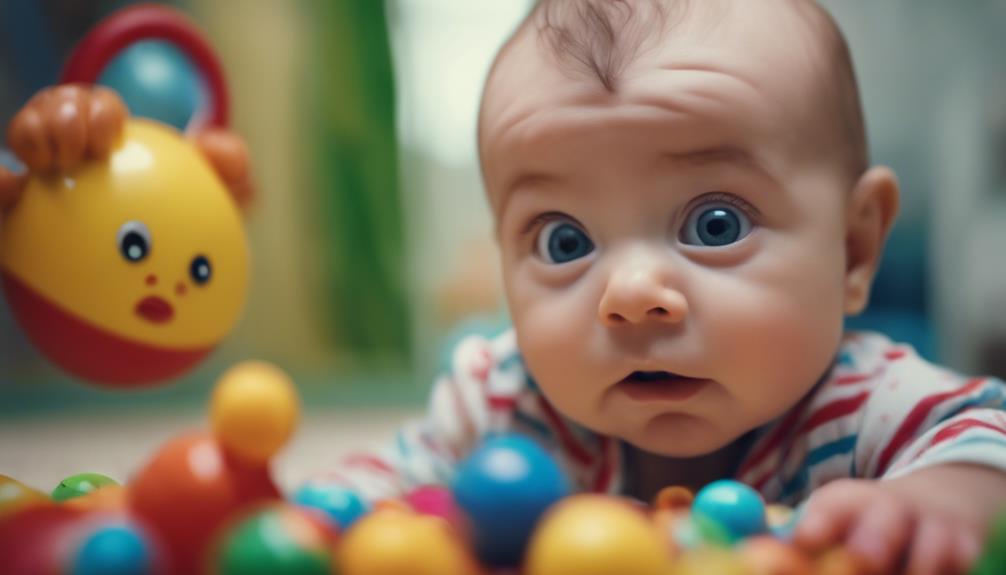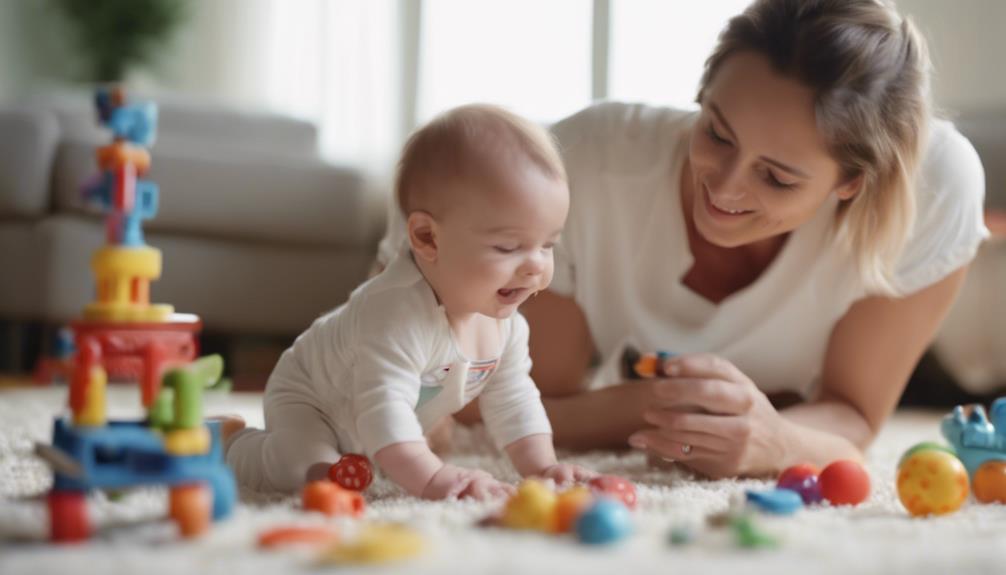Discover the exciting journey of your baby’s brain development during the first year, from exploring their senses to problem-solving feats. Watch as they become aware of the world around them through sight and sound, develop object permanence, and start understanding language. Their sense of differentiation emerges by 3 months, object permanence solidifies by 6-9 months, and problem-solving abilities emerge at 9-12 months. Language skills blossom within a year, with vocabulary growth reaching a peak at 15 months. Engage with your child to enhance their basic math and organization skills by age 2. By age 3, intricate cognitive abilities begin to shine through. Cherish each milestone as your child’s mind expands and flourishes. Dive into the fascinating world of your baby’s cognitive growth, and witness the magic of their development unfold before your eyes.
Key Takeaways
- Sensory exploration and object differentiation mark early cognitive development.
- Improved visual and auditory awareness, tracking moving objects, and recognizing familiar faces.
- Object permanence develops around 6-9 months, aiding problem-solving skills.
- Language comprehension progresses, responding to names, gestures, and basic commands.
- Basic counting and sorting skills emerge by 2 years, indicating cognitive growth.
Birth to 3 Months: Early Cognitive Development
During the first three months of your baby's life, early cognitive development is characterized by sensory exploration, object differentiation, and an emerging understanding of animate versus inanimate objects. Your child's development during this period involves a keen interest in their surroundings, as they track moving objects with their eyes and respond to various sounds and voices.
Infants can distinguish between familiar faces and voices, often showing a preference for their primary caregivers. At this stage, babies also begin to grasp the concept of cause and effect by observing simple actions and reactions in their environment. Additionally, they may start recognizing familiar objects and exhibit early signs of memory and recognition.
This foundational stage sets the groundwork for more complex cognitive abilities to develop as your baby progresses through the first year of life.
3 to 6 Months: Visual & Auditory Awareness
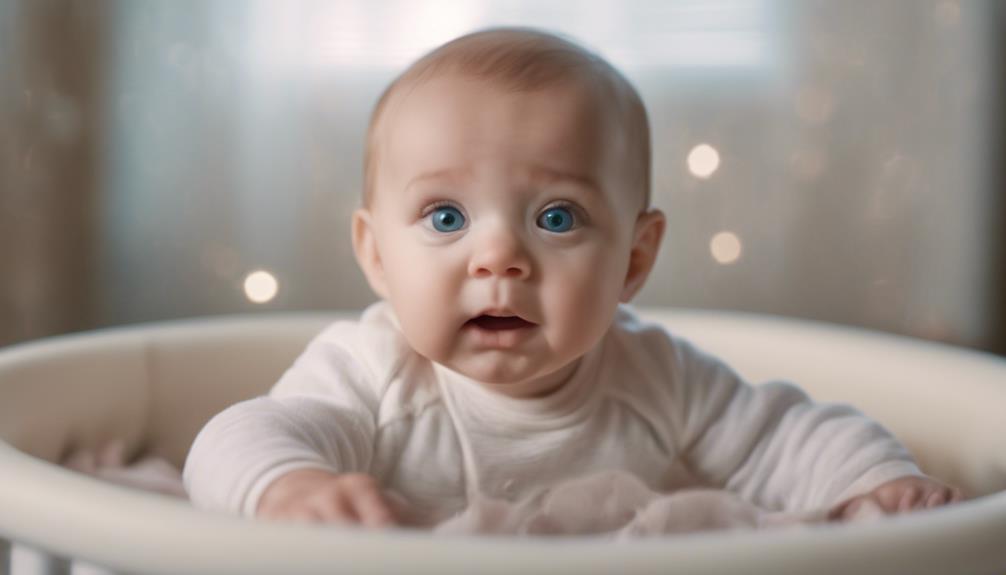
Moreover, during the first six months of your baby's life, their visual and auditory awareness blossoms as they develop the ability to track moving objects with their eyes and turn towards sounds and voices.
By this stage, babies can follow objects with their eyes and focus on faces, showing improved visual awareness. Additionally, they start to respond to sounds and voices by turning their heads, indicating developing auditory awareness. Babies can now recognize familiar voices and sounds, demonstrating an understanding of auditory cues in their environment.
Their visual tracking skills enhance, allowing them to track objects or people as they move around. Moreover, auditory awareness enables babies to engage with sounds in their surroundings, responding to their name being called.
This period marks significant progress in your baby's ability to perceive and interact with the visual and auditory stimuli around them.
6 to 9 Months: Object Permanence Development
Around 6 to 9 months, your baby begins to grasp the concept of object permanence, understanding that things exist even when not in view. This milestone is crucial for cognitive growth as it allows babies to hold mental representations of objects. You may notice your baby engaging in searching behaviors for hidden objects, demonstrating their growing understanding of object permanence. This development helps babies anticipate and predict events, laying the foundation for problem-solving skills. Mastery of object permanence sets the stage for more advanced cognitive abilities like symbolic thinking and memory retention.
| Object Permanence Development |
|---|
| – Develops around 6-9 months |
| – Signifies mental representations of objects |
| – Babies exhibit searching behaviors for hidden objects |
| – Helps anticipate and predict events |
| – Paves the way for problem-solving skills |
9 to 12 Months: Problem-Solving Abilities
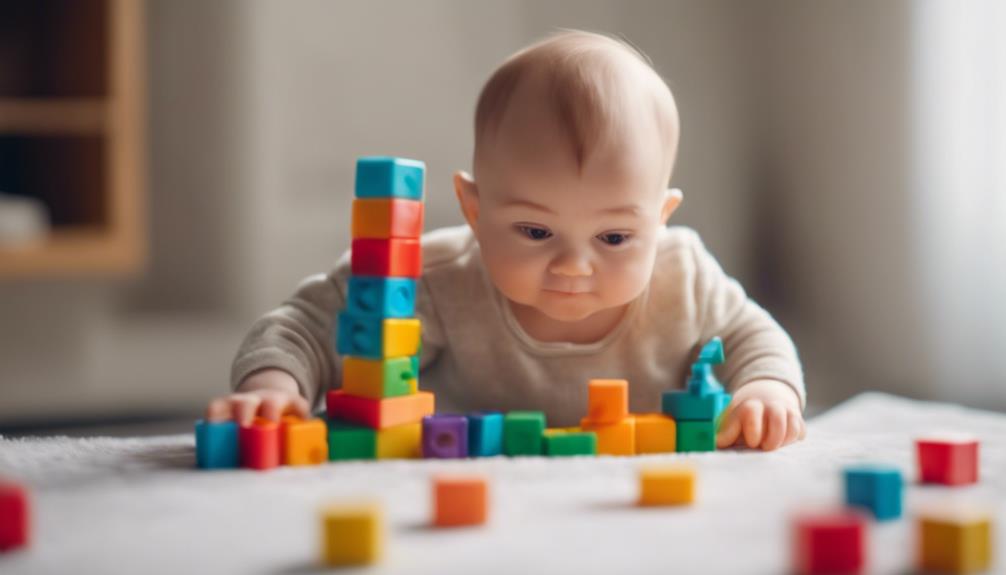
By the time your baby reaches 12 months, their problem-solving abilities become increasingly evident through their interactions and activities. At this stage, your baby's brain is rapidly absorbing information, aiding in the development of problem-solving habits.
You may notice your little one finding hidden objects, showcasing their growing problem-solving skills. Simple instructions and tasks start to engage them, demonstrating cognitive development. Repetitive actions like stacking blocks indicate learning and memory skills are also progressing.
Encouraging exploration and play can further enhance their cognitive development during this critical period. By age one, your baby is likely to exhibit a range of problem-solving abilities, laying the foundation for more complex cognitive skills in the future.
Keep providing stimulating activities and opportunities for your baby to explore, as these experiences play an essential role in nurturing their problem-solving capabilities.
1 Year: Language Comprehension Progress
As your baby progresses through their first year, their language comprehension skills undergo rapid development, marked by the ability to understand simple phrases and instructions. This growth in language comprehension is essential for effective communication and interaction.
Here are some key milestones in your baby's language comprehension progress:
- Recognition of Family Members: By age one, infants can start recognizing family members and responding to their names, showing an early understanding of familiar faces and sounds.
- Appropriate Gestures: Babies waving hi or bye appropriately by 12 months demonstrate their comprehension of social cues and simple directions.
- Understanding 'No': One significant milestone is when babies begin to grasp the meaning of 'no', showcasing their ability to comprehend and respond to negative commands.
- Response to Words and Gestures: Responding to words and gestures becomes more pronounced as babies develop their language comprehension skills, enhancing their ability to engage in basic communication.
15 Months: Vocabulary Expansion
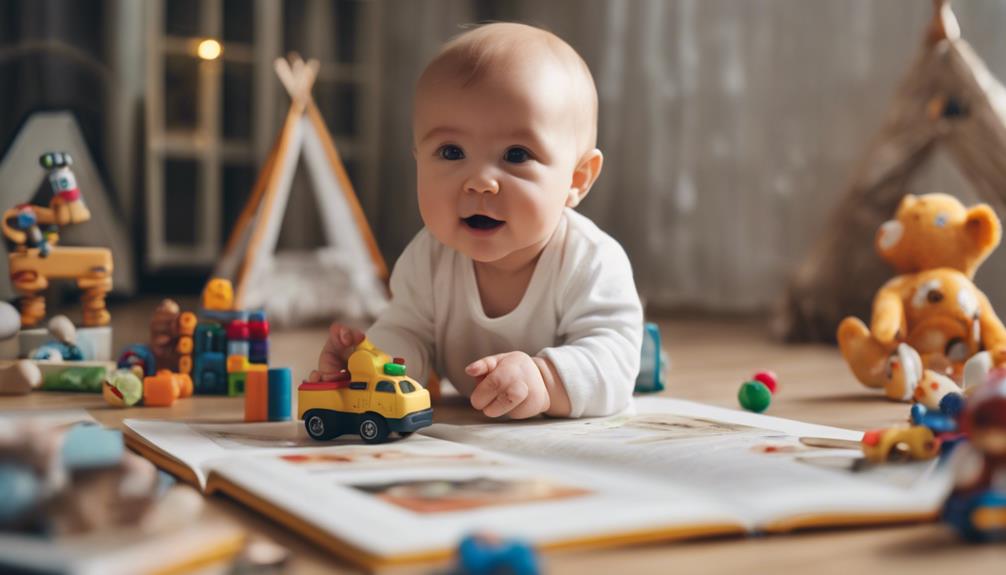
By 12 months, your baby typically knows 2-3 words and can understand simple commands like 'come here' or 'where is the ball?'.
They might start imitating sounds and gestures to communicate, showing growth in receptive language skills.
This vocabulary expansion is an important step in your baby's language development journey.
Word Recognition Growth
How do babies' vocabulary expand within their first year of life?
As your little one grows, their word recognition skills develop in exciting ways. Here's a glimpse of what to expect:
- 6 months: Your baby may start recognizing and responding to their own name, showing early signs of word recognition.
- 8-12 months: Simple words such as 'no' or 'bye-bye' begin to make sense to your baby, showcasing an expanding vocabulary.
- 12-18 months: This is when you might hear your baby utter their first words, marking a significant milestone in their language development.
- 18-24 months: Toddlers at this stage can typically understand and follow basic instructions, demonstrating a rapid growth in vocabulary comprehension.
During the first year, your baby's ability to recognize and understand words progresses steadily, laying the foundation for further language development.
Keep nurturing their language skills through interaction and exposure to new words to support their expanding vocabulary.
Language Development Progress
Within the first year of your baby's life, their vocabulary expands significantly as they progress through various language development milestones. By 6 months, babies start babbling, laying the groundwork for language development.
Around 9-12 months, infants may utter their first words like 'mama' or 'dada,' showcasing advancements in vocabulary expansion. Responding to simple words like 'bye-bye' or 'milk' by 12 months indicates an understanding of language cues.
Pointing at desired objects or recognizing familiar words by 8-10 months signifies cognitive growth in language comprehension. Between 10-12 months, babies may imitate sounds and make attempts to communicate verbally, enhancing their language skills.
This progression in language development and vocabulary expansion during the first year is essential for your baby's overall cognitive growth and future communication abilities. Encouraging and engaging with your baby during this time can further support their linguistic development.
18 Months: Simple Instructions Understanding
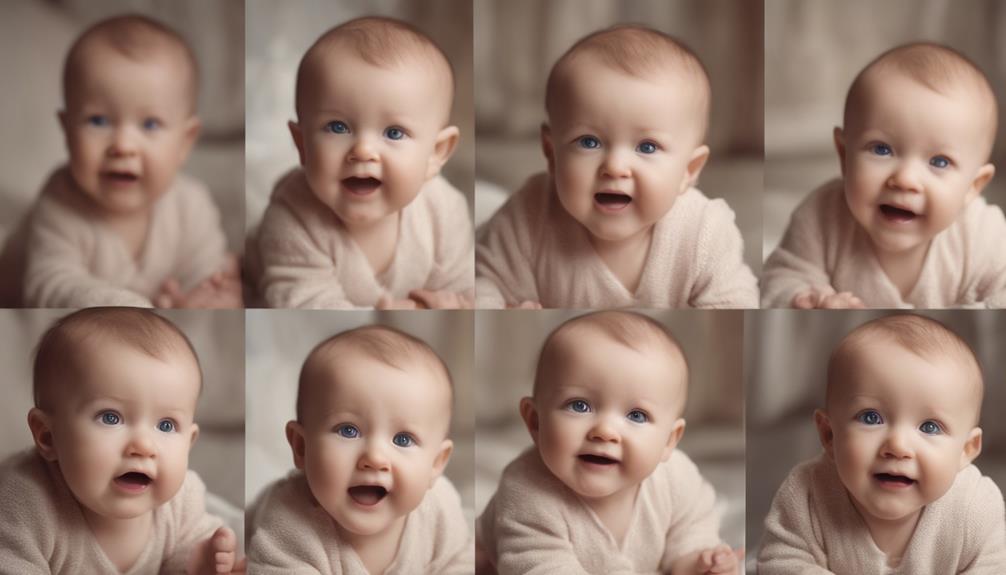
By 9 to 12 months, your baby might start grasping simple instructions like 'wave bye-bye' or 'clap hands,' showing their growing ability to understand and follow basic commands.
At around 1 year old, infants can begin responding to straightforward directions, indicating progress in their cognitive development.
Encouraging these early responses helps nurture language comprehension and reinforces your little one's cognitive skills.
Language Development Progress
Around the 9-month mark, your baby starts grasping simple instructions like 'wave bye-bye' or 'give me the toy,' marking a significant step in language development progress. This period is vital for enhancing their receptive language skills. Here's what you might notice:
- Response to Requests:
Your baby may respond to requests to clap their hands or point to objects they recognize, showing an understanding of basic commands.
- Cognitive Growth:
Understanding and responding appropriately to simple instructions indicate cognitive growth and receptive language skills are developing well.
- Language Comprehension:
Encouraging and practicing simple instructions can further enhance your baby's language comprehension abilities, helping them communicate effectively.
- Key Indicator:
The ability to understand and follow basic commands at 9 months is a significant milestone in your baby's language development journey.
Following Basic Commands
As your baby reaches the 9 to 12-month mark, they begin to understand and follow simple commands or instructions, like 'clap your hands' or 'give me the toy'.
This newfound ability to follow commands is a significant step in their cognitive development. By responding to basic directions, your little one demonstrates their growing comprehension skills and capacity to process verbal information.
It's fascinating to observe how they can now act upon these instructions, showing progress in their cognitive abilities. Encouraging your baby to follow commands not only fosters their cognitive growth but also enhances their communication skills.
This milestone signifies that your baby is starting to grasp the meaning behind words and is developing the ability to carry out simple tasks based on verbal cues. Celebrate each instance where your baby follows a command, as it showcases their expanding cognitive capabilities and understanding of the world around them.
2 Years: Basic Counting & Sorting Skills
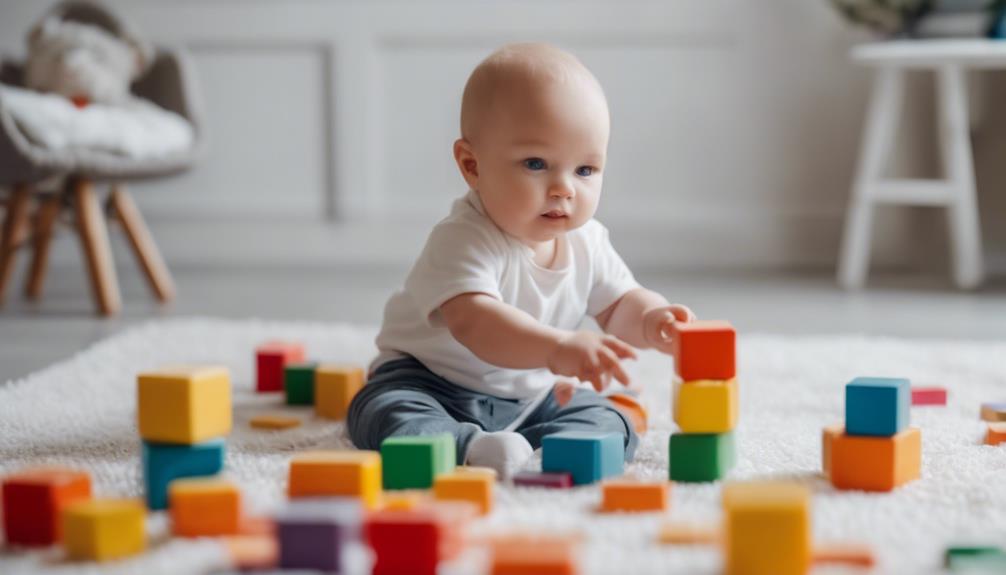
Developing basic counting and sorting skills in your baby's first year is essential for their cognitive growth. Here are some key points to keep in mind:
- Recognition of Quantities: Babies start recognizing small quantities and understanding simple number concepts early on.
- Development of Sorting Skills: Sorting skills begin to emerge as babies categorize objects based on attributes like size, shape, and color.
- Imitating Counting Behaviors: By age one, babies may imitate counting behaviors and show an ability to identify a few numbers.
- Engaging Activities: Simple matching games and play with toys that involve counting, sorting, and categorizing can help babies practice these skills in a fun and interactive way.
3 Years: Advanced Cognitive Functions
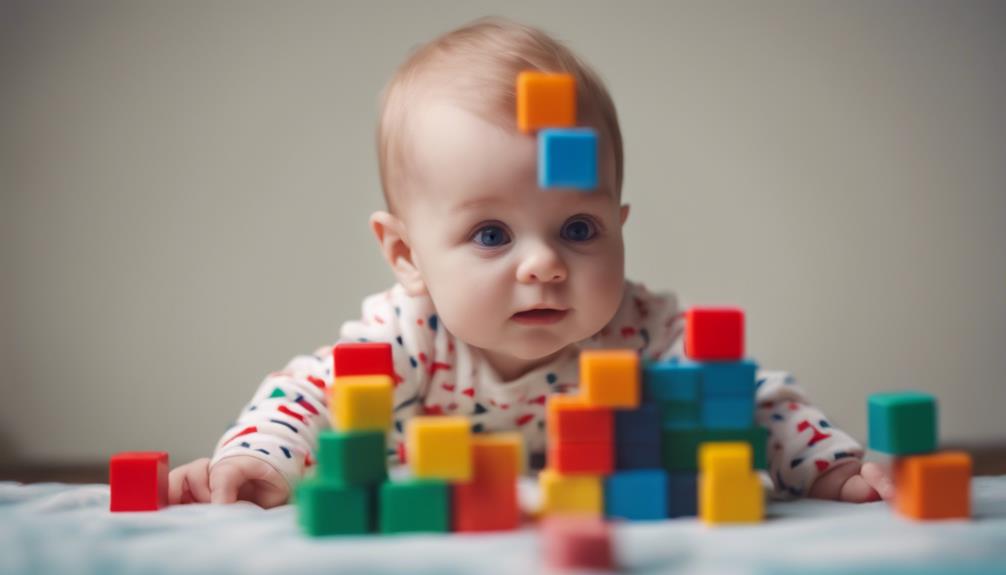
As your baby progresses into the later years, advanced cognitive functions begin to emerge, showcasing their growing abilities to understand, interact, and learn from their surroundings. During this stage, children learn through common developmental milestones that build upon their earlier cognitive achievements.
By age one, babies can find hidden objects, follow simple instructions, and engage in activities like stacking blocks, demonstrating their cognitive advancement. Their brains rapidly absorb information, aiding in the development of learning, thinking, and problem-solving skills.
Between 9 to 12 months, key cognitive milestones include engaging with picture books, imitating actions, and exploring more complex interactions. By the time they reach 1 to 2 years old, children typically achieve milestones such as observing adult actions, identifying objects, differentiating between self and others, and responding to words.
These milestones highlight the significant progress in cognitive functions as children grow and learn to navigate and understand the world around them.
Frequently Asked Questions
What Is a Cognitive Milestone of a Baby?
You can notice a cognitive milestone in your baby when they start recognizing familiar faces and objects. It's amazing to see them engage with simple tasks and respond to your voice, showing their growing awareness and understanding.
What Are the Major Milestones of the First Year of an Infant's Life?
You're exploring major milestones in your baby's first year. Discover how they differentiate objects, follow simple instructions, and enjoy picture books by 9-12 months. Watch as they imitate actions and respond to words, marking cognitive growth.
What Is Cognitive Development in the First Year of Life?
In the first year of life, your baby's cognitive development involves learning, problem-solving, and absorbing information rapidly. They start recognizing objects, imitating actions, and exploring senses early on, laying the foundation for future cognitive skills.
What Cognitive Skills Does a 1 Year Old Have?
At age one, you possess impressive cognitive skills. You can find hidden objects, follow simple instructions, and repeat actions like stacking blocks. Your brain absorbs information rapidly, allowing you to learn and adapt quickly.
Conclusion
As your baby grows and develops, their cognitive milestones will continue to amaze you. From early visual awareness to advanced problem-solving abilities, each stage brings new discoveries and accomplishments.
Just like a budding flower reaching towards the sun, your little one's mind is blossoming with potential. Keep nurturing their growth and watch as they bloom into intelligent, curious individuals.
The journey of cognitive development is a beautiful one, filled with endless possibilities.

